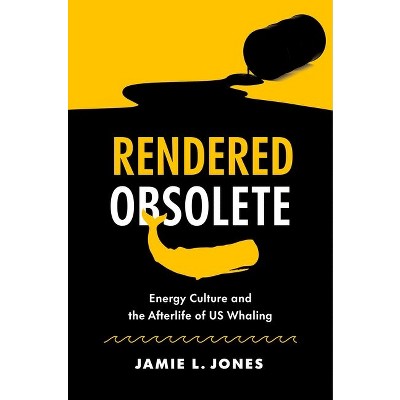Sponsored

Rendered Obsolete - by Jamie L Jones (Hardcover)
$99.00
In Stock
Eligible for registries and wish lists
Sponsored
About this item
Highlights
- Through the mid-nineteenth century, the US whaling industry helped drive industrialization and urbanization, providing whale oil to lubricate and illuminate the country.
- Author(s): Jamie L Jones
- 262 Pages
- Literary Criticism, American
Description
About the Book
"Through the mid-nineteenth century, the United States whaling industry drove industrialization and urbanization, offering ways to lubricate and illuminate the country. The Pennsylvania petroleum boom of the 1860s brought cheap and plentiful petroleum into the market, decimating whale oil's popularity. Here, Jamie L. Jones tells that story from the flipside of the modern age of fossil fuel - a history of how the whaling industry held firm to U.S. popular culture even as it slid into obsolescence. Jones shows just how instrumental whaling was to the very idea of 'energy' in American culture, and how it came to mean a fusion of labor, production, and the circulation of power. Analyzing a vast archive that includes novels, artifacts from whaling ships, periodicals, tourist attractions, and even whale carcasses, Jones explores the histories of race, labor, and energy consumption in the nineteenth century United States through the lens of the whaling industry's legacy. She shows that dying industries exert real force on environmental perceptions and cultural imaginations. In terms of how we view power as a nation, we are, she argues, still living in the shadow of the whale"--Book Synopsis
Through the mid-nineteenth century, the US whaling industry helped drive industrialization and urbanization, providing whale oil to lubricate and illuminate the country. The Pennsylvania petroleum boom of the 1860s brought cheap and plentiful petroleum into the market, decimating whale oil's popularity. Here, from our modern age of fossil fuels, Jamie L. Jones uses literary and cultural history to show how the whaling industry held firm in US popular culture even as it slid into obsolescence. Jones shows just how instrumental whaling was to the very idea of "energy" in American culture and how it came to mean a fusion of labor, production, and the circulation of power. She argues that dying industries exert real force on environmental perceptions and cultural imaginations.Analyzing a vast archive that includes novels, periodicals, artifacts from whaling ships, tourist attractions, and even whale carcasses, Jones explores the histories of race, labor, and energy consumption in the nineteenth-century United States through the lens of the whaling industry's legacy. In terms of how they view power, Americans are, she argues, still living in the shadow of the whale.
Review Quotes
"Excellent and deeply absorbing. . . . Rendered Obsolete convincingly shows that the decline and fall of the US whaling industry, following the petroleum boom of the 1860s, is far better understood as a series of transformations and transitions, its apparent obsolescence a sign of its enduring and shifting significance for a late nineteenth- and twentieth-century (and, for the most part, white and masculine) US cultural imaginary."--International Journal of Maritime History
"Rendered Obsolete successfully delivers on its mission of sketching the affective dimensions of energy transition. . . . [A]n effective reminder that energy is not immaterial, not easily fungible, but rather inheres in the stormy affective and aesthetic experiences of real human beings."--New England Quarterly
"With today's intensifying climate crisis and the absolute necessity of abating fossil fuels, Rendered Obsolete presents a thought-provoking interpretation of the earlier shift from organic to fossil energy and the obstacles inherent in transitioning to a greener environment."--Journal of American History
"Evocative. . . . Rendered Obsolete successfully argues for recognizing that 'obsolete' energies and industries do not disappear and continue to have cultural and political significance. Although Rendered Obsolete is categorized as a monograph in literary studies, it is very much an environmental history text as well. . . . [H]ighly interdisciplinary. . . . [A] significant contribution to energy history and energy humanities more broadly."--Environmental History
"Rendered Obsolete is an outstanding work of scholarship, pushing the field of energy humanities in fresh, interdisciplinary directions by bringing together literary analysis, material and print cultures, museum studies, archival work, and visual studies to demonstrate the ubiquity of fossil modernity in patterns of thought as much as in objects, energy habits, and logistics networks."--Transatlantica
"Combined, these chapters offer a nuanced, novel take on how whaling and whaling culture reflect 'the flickering associations of modernity and obsolescence' (p. 113) in the late nineteenth and early twentieth centuries."--Technology and Culture
Dimensions (Overall): 9.21 Inches (H) x 6.14 Inches (W) x .75 Inches (D)
Weight: 1.29 Pounds
Suggested Age: 22 Years and Up
Sub-Genre: American
Genre: Literary Criticism
Number of Pages: 262
Publisher: University of North Carolina Press
Theme: General
Format: Hardcover
Author: Jamie L Jones
Language: English
Street Date: August 29, 2023
TCIN: 1003045765
UPC: 9781469674810
Item Number (DPCI): 247-50-2886
Origin: Made in the USA or Imported
If the item details aren’t accurate or complete, we want to know about it.
Shipping details
Estimated ship dimensions: 0.75 inches length x 6.14 inches width x 9.21 inches height
Estimated ship weight: 1.29 pounds
We regret that this item cannot be shipped to PO Boxes.
This item cannot be shipped to the following locations: American Samoa (see also separate entry under AS), Guam (see also separate entry under GU), Northern Mariana Islands, Puerto Rico (see also separate entry under PR), United States Minor Outlying Islands, Virgin Islands, U.S., APO/FPO
Return details
This item can be returned to any Target store or Target.com.
This item must be returned within 90 days of the date it was purchased in store, shipped, delivered by a Shipt shopper, or made ready for pickup.
See the return policy for complete information.
Trending Poetry

Bestseller
$22.89
was $24.50 New lower price
Buy 2, get 1 free select books
4.6 out of 5 stars with 50 ratings


$22.80
MSRP $38.00
Buy 2, get 1 free select books
4.8 out of 5 stars with 12 ratings

$23.09
Buy 2, get 1 free select books
4.6 out of 5 stars with 32 ratings

$23.09
Buy 2, get 1 free select books
4.4 out of 5 stars with 30 ratings

$9.85 - $23.09
MSRP $15.99 - $32.99
Buy 2, get 1 free select books
4.8 out of 5 stars with 146 ratings





